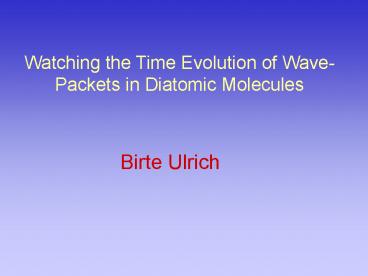Watching the Time Evolution of Wave-Packets in Diatomic Molecules - PowerPoint PPT Presentation
1 / 23
Title:
Watching the Time Evolution of Wave-Packets in Diatomic Molecules
Description:
Double ionization of molecules and the production of higher charge states ... before it Coulomb explodes. KER from Coincidence O O O2. O2 O2 2. O2 5. O2 4. O2 3 ... – PowerPoint PPT presentation
Number of Views:33
Avg rating:3.0/5.0
Title: Watching the Time Evolution of Wave-Packets in Diatomic Molecules
1
Watching the Time Evolution of Wave-Packets in
Diatomic Molecules
Birte Ulrich
2
Outline
Double ionization of molecules and the
production of higher charge states Dissociation
and CREI with long laser pulses COLTRIMS
technique Technical improvements on the
chamber Pump-probe experiments with H2, D2 and
O2 Molecular wave packet motion in H2
Molecular wave packet motion in O2 Summary
3
Kinetic energy release for double ionization of
O2 for short and long pulse high intensity
Short pulse freezes the nuclear motion Coulomb
explosion from smaller internuclear distances
lead to higher kinetic energy release
short pulse
Long pulse let the molecule dissociate before it
Coulomb explodes
long pulse
KER from Coincidence O O
4
Looking at higher charge states
How will higher charged molecules ionize, which
almost certainly evolve from doubly charged
molecules?
5
Enhanced Ionization
H2
time
Theory predicted two maxima in the ionization
rates at critical distances Rc7 a.u.
and Rc10 a.u. ??!!!
6
COLD Target Recoil Ion Momentum Spectroscopy
repetition rate 1000 Hz wave length 800 nm
Laser-Polarization
7
Problems Experiments with very high intensities
caused an immense count rate and
made the analysis impossible.
Solution Piezoelectrical slits to make the jet
thinner. Thus a lower count rate
would make it possible to run with
higher intensities.
Limiting factor The background in the chamber
will limit the thickness
of the jet.
8
cut by piezoelectrical slits from 1.5mm down to
50 µm
jet
Scanning of the laser focus for different jet
sizes by changing the position of the spherical
mirror
spherical mirror
laser
moved by a manipulator
laser focus
1 0 -1
A jet thinner than the Rayleigh length makes it
possible to enhance the production of higher
charge states in comparison to lower charge states
Saturation Ar2
9
Optimization of the ratio of Ar2/Ar by scanning
the laser focus
Out of the jet
-1
0
Out of the jet
1
10
Comparison between data taken with a jet
thickness of 1.5 mm and around 50µm
O2 long pulse, intensity 9.2 x1014 W/cm2 Count
rate 15000
O2 long pulse, intensity 7 - 8 x1014 Count
rate 1100
OO
OO
OO
OO2
OO2
OO3
OO2
O2O
O2O2
O3O
O2O
O2O2
O2O2
O2O
O3O2
O2O3
tof2 vs tof1
tof2 vs tof1
Jet Thickness1.5 mm
Jet Thickness50 µm
11
Higher charge states with long pulse and short
pulse high intensity
NN
tof2 vs tof1
tof2 vs tof1
But No higher charge states with short pulse
(8fs) very high intensity. Does a CREI like
ionization mechanism lead to higher charge states?
12
Pump-Probe Setup
d
d
Pump pulse
pump-pulse
Probe pulse
probe-pulse
?
d
d
Pump probe goes through a medium of thickness d,
while probe pulse pass a thickness x. x gt d ?
time delay between the pulses in dependence on
the angle ?.
pump-pulse
?
x
probe-pulse
13
H2 Potential curves
pump pulse intensity 11014 W/cm2
single ionizes probe pulse intensity
11015 W/cm2 double ionizes
14
H2 Vibrational Packet
?g ionization ?u dissociation
Model Xiao-Min Tong ,C.D.Lin
Pump 8 fs 1014 W/cm2
15
Pump-Probe for H2
Oscillation of wave packet on the 1sg potential
data after background subtraction
Sequential ionization on 1su potential curve
16
Model for the Kinetic Energy Release
Comparison calculation and experiment
assumptions 5.2 a.u. internuclear
distance for the electron to
free. 12fs time
it takes the wave packet
to reach the outer
turning point.
17
Pump probe for D2 with weaker probe pulse
Pump probe with lower intensity enables the
Observation of CREI features.
R1
R2
18
Enhanced Ionization
H2
time
Theory predicted two maxima in the ionization
rates at critical distances Rc7 a.u.
and Rc10 a.u. ??!!!
But we always found in our experiments with the
long pulse that the CREI position may shift as
the laser intensity increases..
19
Comparison with the theory
calculation Xiao-Min Tong, C.D. Lin
8 fs, 2x1015 W/cm2
20
Pump-Probe for O2
Oscillation of wave packet(s) in bond potential
Sequential ionization on dissociation curve
21
1-D Display of the KER for Oxygen for pump probe
with different time delays
Higher kinetic energy release due to smaller
internuclear distances.
small delays
higher delays
KER from Coincidence O O
22
Summary
H2 shows two features evolving with the
delay Oscillation of the wave packet in 1sg
potential and sequential ionization on the
1su potential curve.
O2 shows similar features like H2, but it is
not yet understood which potentials are
involved in the ionization process.
Pump-probe experiments on O2 with higher delays
would be interesting to see, how the
ionization process evolve.
23
Time of flight for O2































